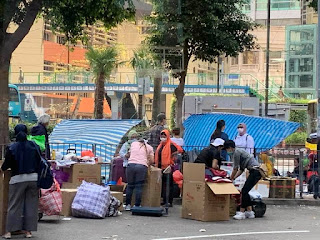 |
| Face masks sold online vary in prices, quality, and place of origin |
Foreign domestic workers have not been spared by scammers
who have been taking advantage of the near-desperate attempts by many in Hong Kong to secure surgical masks at any cost.
These scammers have been offering the face masks online at
attractive prices, especially for bulk purchases. In three cases alone
involving both Filipino and Indonesian domestic workers, the amount involved
was at least $300,000.
Not included in these big cases are individual buyers who
reported losing between $6,000 and $12,000 to fellow Filipinos who reportedly
blocked them online after they had paid for the highly sought-after protection
against the novel coronavirus.
Neither do they include a local Hong
Kong buyer who had complained to the Consulate, claiming to have
lost $200,000 to a Filipino supplier who could no longer be contacted after the
money was sent.
The biggest single case of a Filipino domestic worker being
allegedly victimized was that of M.G., who sought the Consulate’s help after
failing to receive from her Filipina supplier the promised 1,500 boxes of face
masks, for which she had paid $120,000.
M.G. said she purchased the masks for a Filipina friend, who
claimed she wanted them for her big family, and that of her boyfriend’s.
“If for business di ko po alam kasi tumulong lang sya,” said
M.G. in a text message.
“At siya po ang nag finance, hindi ako.”
M.G. first sent $80,000 to the Filipina supplier, R.F., to
pay for 1,000 boxes, each containing 50 pieces, at below-market price of $80 a
box on Feb. 8. She then sent a further $40,000 for 500 more boxes.
After failing to receive the masks as promised on two
separate dates, M.G. sought help from the Consulate on Feb. 23.
 |
| Press here to get the App |
On the same day, another Filipina also sought help from the
Consulate, claiming she had been scammed out of the $24,465 she had paid the
same supplier for 300 boxes of face masks.
A Filipina who had brokered both deals had reportedly assured
the Consulate that the money would be returned to the buyers within a few days.
 |
| Masked Filipinos at the Consulate on a Sunday |
Arnel de Luna, an officer at the assistance to nationals
section of the Consulate declined to give details of specific cases, but said
they could intercede if the parties involved are Filipinos.
“Hahabulin natin kung Filipino nationals ang involved, pero
kung hindi naisauli ang pera, kailangan na silang magsumbong sa pulis,” said de
Luna.
But in most cases, he said the complainants hesitate about
going to the police because they fear being investigated in turn for engaging
in business, something not allowed under their employment visas.
This was true in the case of V.S., who admitted in a recent
Facebook post, to having collected a total of $11,475 from a number of buyers,
some of whom had placed orders on behalf of their employers.
V.S. said she accepted full responsibility for the failure
of her supplier to deliver the face masks as promised. She said she had to
borrow money just so she could refund her buyers, and at the time of her post,
had already returned a total of $7,000.
Another buyer, Marie (not her real name), sought help from
the online group, Domestic Workers Corner, after losing $5000 to an online
seller she met only on Facebook, and whose location had been listed down as
United Kingdom.
After she had sent the money, Marie said she was suddenly
blocked on Facebook by the seller. A friend she consulted told her the person
who just scammed her appeared to be a fellow Filipino.
Marie said she spent several nights crying over the money
she lost, as she had been saving it up for three months. When her kindly
employer learned what had been causing Marie sleepless nights, she gave the
helper $2,000, but warned her to seek advice first before sending money to an
unknown person.
There was no such relief for a group of Indonesian domestic
workers who collectively lost about $150,000 to scammers peddling surgical
masks online.
According to Indonesian migrant leader Eni Lestari, the
victims reported the fraud to their consulate last Sunday, Mar. 1. But as in
the case of the Filipina victims, they were hesitant to go to the police,
fearing their complaint could backfire.
Meanwhile, a source at the Consulate confirmed that a local
resident had sought help about being made to pay a Filipino seller for $200,000
worth of face masks that never arrived, but declined to give more details. The
case is being investigated.
Since the coronavirus outbreak in mid-January, people in
Hong Kong have been scrambling get hold of surgical masks, which apart from
frequent hand-washing, is believed to be the best defense for warding off
infection.
The demand for the protection gear reached fever point when
supply began to dwindle, and residents started surfing the internet for
suppliers, inevitably setting off signals to unscrupulous groups to take
advantage of their desperation.
As early as Jan. 31, Hong Kong
police had warned of scammers offering face masks online. At that time, the
losses incurred by the victims were relatively low, ranging from a few hundred
to $1,000.
But on Feb. 6, the scammers appeared to have become bolder,
with a total haul of $580,000 being collected from victims. Six men and two
women behind the scam were reportedly arrested.
A week later, the amount lost jumped up to $1.1 million,
with more than 300 complainants. The amounts involved ranged between $100 and
$250,000. Ten men and two women were arrested.
The latest incident involved about 100
Hongkongers being lured into paying up to $400 for each box of face masks. The
total amount lost to what was said to be an organized gang on Facebook, was
$60,000.
In Singapore























